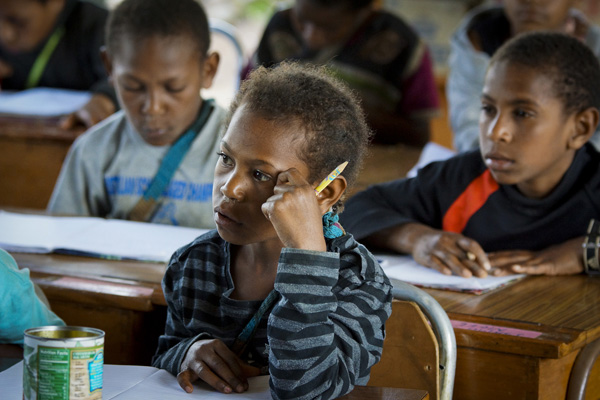
Papua New Guinea is home to over 830 languages. Each of these language communities has important potential for confidence and self-awareness, but they may never achieve this unless mother tongue literacy is developed. SIL-PNG is dedicated to development and promotion of vernacular literacy activities, including developing orthographies for unwritten languages.
SIL-PNG believes that indigenous cultures are best preserved through written language. Once local knowledge is written, it is preserved for future generations and provides the best path into languages of wider communication. Recent efforts to introduce mother tongue into early education in various developing countries have shown that the vernacular is the best medium for establishing lasting literacy efforts.
Vernacular language development is critical in preparing indigenous cultures to meet the demands of the greater world. SIL-PNG seeks to improve rural citizens’ literacy by running informal workshops to train teachers and develop reading and writing materials. Originally, this was accomplished one language at a time, but in recent years there have been increasing opportunities to equip and train trainers to do literacy work in multi-language projects. The National Department of Education recently had SIL-PNG literacy trainers teach how to develop bridging curricula, within formal teacher training institutions. SIL-PNG considers this collaborative effort vital, as the organization values empowering local people of all ages through knowledge of their own written language. Increasing numbers of PNG college and university graduates have taken up the challenge to promote vernacular education in local communities.
Educators are striving to provide relevant and effective education for elementary teachers in PNG. A high quality tertiary curriculum for universities and colleges will respect and encourage the preservation of local knowledge and enhance the full development of children, because this will encourage young people to value older men and women, give them a foundation on which to base their world view, and help them to maintain their cultural identity and retain their local languages, while still giving them the understanding necessary to choose change where appropriate. With this foundation each student can embrace global knowledge and communication without losing the respect and security of his or her people.
(Some of this material was adapted from an article written by Mara Iyama, “Oral literacies – choice in cultural destiny” with help from Jens Meyer)

